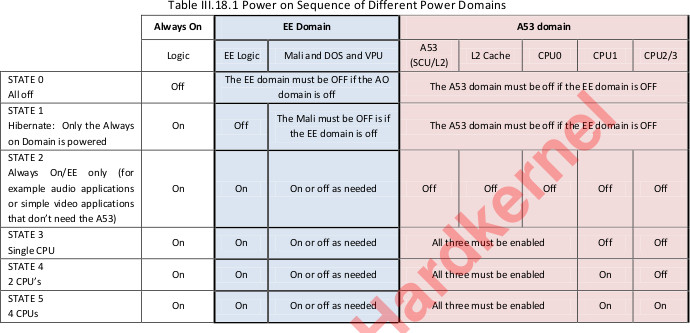When you design a board and/or write drivers for an SoC it helps a lot to get info about electrical characteristics, memory map, registers’ addresses and values to understand how the hardware works, especially for custom applications, but many silicon vendors only distribute such documents under NDA to their business customers, with exception from companies such as Freescale (now NXP), and Texas Instruments. Hardkernel, the company developing ODROID boards, is also trying to release as much documentation as possible for their board such as Amlogic S805 datasheet for ODROID-C1/C1+ boards, and the Korean company has now released Amlogic S905 processor datasheet as the processor is used in their ODROID-C2 board.

Some of the information available in the datasheet include
- Memory map
- Power domain
- CPU and GPU sub-system
- Clock & Reset Unit
- System Boot
- General Purpose Input/Output (GPIO)
- Interrupt Controller
- Direct Memory Access Controller (DMAC)
- Timers
- Crypto
- Etc…
ODROID-C2 was launched at the very end of February, so it took about 3 months for Hardkernel to get the green light from Amlogic to release the datasheet. I hope in the future I can write news starting with “Amlogic releases…” instead of letting their customers release their documentation for them…
Thanks to Nobe for the tip.

Jean-Luc started CNX Software in 2010 as a part-time endeavor, before quitting his job as a software engineering manager, and starting to write daily news, and reviews full time later in 2011.
Support CNX Software! Donate via cryptocurrencies, become a Patron on Patreon, or purchase goods on Amazon or Aliexpress





Unfortunately this is “common practice” in the industry. Datasheets are somehow considered proprietary knowledge and companies seem afraid to share it because their competitors can get their hands on it. Considering there isn’t a huge difference between various ARM chips, it’s really rather silly and these companies don’t seem to understand that they’re losing potential business by being too secretive.
@TLS
+1. I’ll add that competitor are probably getting these documents anyway.
> Unfortunately this is “common practice” in the industry
Nonsense. That was “common practice” 10 years ago. All companies worthy attention release documentation (some are funny and release it via all kinds of organized leaks, but that’s getting old too). The opposite is also true – companies not releasing documentation isn’t worthy attention, there’re so many well supported and documented products now.